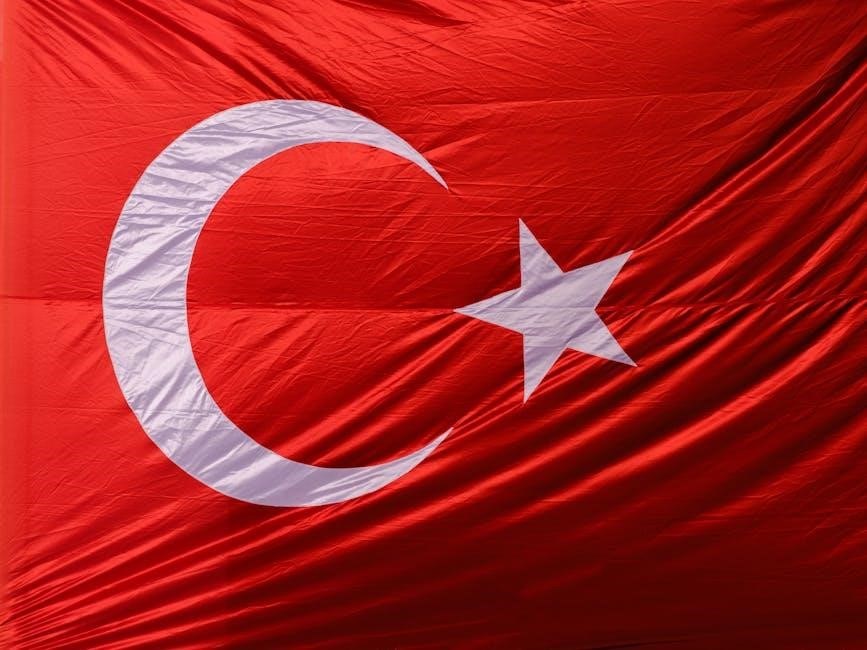A sovereign state is a fundamental concept in international relations‚ representing a political entity with supreme authority over its territory and population. It operates independently‚ free from external control‚ and is recognized by other states and international organizations. The idea of sovereignty forms the cornerstone of modern statehood‚ emphasizing self-governance and the ability to enforce laws and policies within defined boundaries. Understanding the sovereign state is essential for analyzing global politics‚ diplomacy‚ and the structure of international systems.
1.1 Definition of a Sovereign State
A sovereign state is a political entity that possesses supreme authority over a defined territory and population. It operates independently‚ free from external control‚ and is recognized by other states and international organizations. The concept of sovereignty is central to its definition‚ emphasizing the state’s ability to govern itself and enforce laws without interference. A sovereign state typically has four key elements: a permanent population‚ a defined territory‚ sovereignty‚ and a government. These elements collectively establish the state’s legitimacy and capacity to function both internally and within the international community. Sovereignty‚ in this context‚ refers to the state’s exclusive right to regulate affairs within its borders‚ making it the foundation of modern statehood.
1.2 Importance of Sovereignty in International Relations
Sovereignty is a cornerstone of international relations‚ ensuring states are treated as equals under international law. It grants states the authority to govern themselves without external interference‚ fostering diplomatic relations and cooperation. Sovereignty ensures non-interference in domestic affairs‚ promoting stability and reducing conflicts. It allows states to negotiate treaties‚ establish alliances‚ and participate in global governance. The principle of sovereignty is enshrined in the UN Charter‚ emphasizing the equality of states and their right to self-determination. This principle is vital for maintaining international order‚ enabling states to address global challenges collectively while preserving their independence. Sovereignty also underpins the legitimacy of international organizations‚ ensuring their actions respect the autonomy of member states.
1.3 Historical Context of Sovereign States
The concept of the sovereign state evolved over centuries‚ with roots in the Peace of Westphalia (1648)‚ which established the modern state system. This treaty recognized the principle of territorial sovereignty‚ ending feudal fragmentation and religious conflicts in Europe. The rise of nation-states solidified the idea of centralized authority‚ with states gaining control over their territories and populations. Key philosophers like Jean Bodin and Thomas Hobbes later theorized sovereignty as the ultimate authority within a state. The 19th and 20th centuries saw the spread of sovereignty globally‚ influenced by nationalism and decolonization. Today‚ sovereignty remains a cornerstone of international relations‚ shaping state interactions and global governance. Understanding its history is crucial for grasping its role in modern geopolitics.
Key Features of a Sovereign State
A sovereign state is defined by four core elements: a defined population‚ a specific territory‚ the authority to exercise sovereignty‚ and the presence of a functioning government.
2.1 Population as a Core Element
A sovereign state requires a defined and permanent population‚ which forms the foundation of its identity and governance. The population is a body of individuals living within the state’s territory‚ bound by shared legal‚ social‚ and political frameworks. This element ensures the state’s continuity and legitimacy‚ as the people within its borders are subject to its laws and governance. The size and characteristics of the population can influence the state’s sovereignty‚ as it determines the capacity to exercise authority and maintain independence. Without a distinct population‚ a state cannot function effectively or assert its sovereignty in international relations. Thus‚ the population is essential for establishing and sustaining a sovereign state’s identity and operational framework.
2.2 Territory and Its Significance
Territory is a vital component of a sovereign state‚ representing the physical land and resources over which the state exercises jurisdiction. Defined borders establish the limits of a state’s authority‚ ensuring clarity in governance and international recognition. Disputes over territory can lead to conflicts‚ highlighting its importance in maintaining sovereignty and stability. The territory provides the spatial foundation for the state’s population and government to function effectively. It also holds economic and strategic value‚ contributing to the state’s power and influence. Without a defined territory‚ a state cannot assert its sovereignty or fulfill its role in international relations‚ making territory indispensable for the existence and operation of a sovereign state.
2.3 Sovereignty and Its Implications
Sovereignty refers to the supreme authority of a state to govern itself and its territory without external interference. It is the cornerstone of statehood‚ enabling a state to enact laws‚ enforce policies‚ and maintain control over its affairs. Sovereignty implies independence‚ where a state’s decisions are not subject to another entity’s will. This concept is vital for maintaining international order‚ as it ensures that states respect each other’s autonomy. However‚ sovereignty can be challenged by globalization‚ international treaties‚ and human rights interventions‚ which sometimes limit a state’s absolute authority. Despite these challenges‚ sovereignty remains a defining feature of modern states‚ shaping their interactions and identities on the global stage.
2.4 Government and Its Role
The government is the administrative framework through which a sovereign state exercises its authority. It is responsible for creating and enforcing laws‚ providing public services‚ and ensuring national security; A government’s structure can vary‚ ranging from unitary systems to federal systems‚ and may include executive‚ legislative‚ and judicial branches. Its primary role is to represent the interests of the population‚ maintain social order‚ and manage resources effectively. Additionally‚ the government facilitates international relations and diplomacy‚ acting as the official representative of the state. Effective governance is crucial for achieving stability‚ economic growth‚ and social welfare‚ thereby upholding the state’s sovereignty and legitimacy in the eyes of its citizens and the international community. The government’s performance directly impacts the state’s overall functioning and global standing.

The Role of a Sovereign State
A sovereign state ensures internal governance‚ provides security‚ and maintains social order. It represents national interests‚ engages in diplomacy‚ and upholds sovereignty while addressing the needs of its population.
3.1 Internal Governance and Administration
Internal governance and administration are central to a sovereign state’s function‚ ensuring the implementation of laws‚ policies‚ and public services. A sovereign state establishes institutions and bureaucracies to manage domestic affairs‚ maintaining order and stability. These systems enable the government to enforce regulations‚ collect taxes‚ and provide infrastructure‚ education‚ and healthcare. Effective administration ensures the state’s continuity and responsiveness to citizens’ needs‚ upholding sovereignty by demonstrating control over its territory and population. Strong internal governance is vital for national development and the well-being of its people‚ reflecting the state’s ability to self-govern efficiently and maintain societal cohesion.
3.2 Foreign Relations and Diplomacy
Foreign relations and diplomacy are critical for a sovereign state’s engagement with the international community. States establish diplomatic missions to communicate‚ negotiate‚ and maintain relations with other nations. Diplomacy facilitates cooperation on global issues‚ resolves conflicts‚ and promotes economic ties. Sovereign states also participate in international organizations‚ fostering multilateral agreements to address common challenges. Effective diplomacy enhances a state’s influence and security‚ ensuring its interests are represented globally. Through treaties‚ alliances‚ and dialogue‚ sovereign states navigate the complexities of international relations‚ balancing national sovereignty with global interdependence. Diplomatic efforts are essential for maintaining peace‚ stability‚ and mutual respect among nations in an increasingly interconnected world.

Types of Sovereign States
Sovereign states vary in structure‚ including unitary‚ federal‚ constitutional monarchies‚ and republics. Each type differs in governance and power distribution while maintaining state sovereignty.
4.1 Unitary States
A unitary state is a sovereign entity with a centralized government‚ where power is concentrated in a single authority. This structure ensures uniform policies and decision-making‚ with regional divisions existing solely for administrative convenience. Unlike federal systems‚ unitary states do not grant significant autonomy to local governments‚ maintaining control over all aspects of governance. Examples include France and Japan‚ where the central government holds supremacy. This system promotes national unity and streamlined governance but may limit regional flexibility and representation. Unitary states are common worldwide‚ reflecting a preference for centralized authority in maintaining sovereignty and ensuring cohesive national policies.
4.2 Federal States
A federal state is a sovereign entity characterized by a division of power between a central authority and constituent political units‚ such as states or provinces. In this system‚ both levels of government derive their authority from the constitution‚ operating within distinct but overlapping jurisdictions. Federalism promotes diversity by allowing regional autonomy while maintaining national unity. Examples include the United States‚ Germany‚ and India. This structure enables tailored governance to regional needs while ensuring a cohesive national framework. However‚ it can lead to conflicts between central and regional governments‚ requiring mechanisms for resolution. Federal states balance unity and diversity‚ addressing the varied needs of a heterogeneous population within a sovereign framework.
4.3 Constitutional Monarchies
A constitutional monarchy is a sovereign state where a monarch serves as head of state‚ but their powers are limited by a constitution or legal framework. The monarch’s role is largely ceremonial‚ with actual governance carried out by elected officials. Examples include the United Kingdom‚ Japan‚ and Sweden. This system combines tradition and democracy‚ ensuring stability while allowing for political representation. The monarch typically represents national identity and unity‚ while the government manages day-to-day affairs. Constitutional monarchies balance heritage with modern governance‚ offering a unique blend of continuity and progress. This structure ensures that the sovereign state maintains its cultural legacy while adapting to contemporary political needs. It is a popular form of governance‚ blending symbolism with functional democracy.
4.4 Republics
A republic is a sovereign state governed by representatives elected by the people‚ rather than a monarch. It emphasizes popular sovereignty‚ where power resides with the citizens. Republics often feature a constitution that outlines the framework of governance‚ ensuring accountability and preventing abuses of power. Examples include the United States‚ France‚ and India. In a republic‚ leaders are typically chosen through elections‚ and decisions are made by a legislative body. This system promotes democratic principles‚ transparency‚ and the rule of law. Republics can vary in structure‚ such as parliamentary or presidential systems‚ but they all prioritize the representation of citizen interests. This form of governance is widely adopted due to its balance of democracy and stability‚ making it a cornerstone of modern statehood.
Challenges Facing Sovereign States
Sovereign states face challenges like territorial disputes‚ internal conflicts‚ economic pressures‚ and threats to sovereignty. These issues often strain resources and test governance capabilities‚ demanding balanced solutions.
5.1 Territorial Disputes and Border Conflicts
Territorial disputes and border conflicts are significant challenges for sovereign states‚ often rooted in historical claims‚ resource competition‚ or geopolitical tensions. These disputes can escalate into military confrontations‚ destabilizing regions and straining international relations. Examples include conflicts in the South China Sea‚ Kashmir‚ and Ukraine. Such issues often involve questions of sovereignty‚ with states asserting rights over contested areas. Border conflicts can also lead to economic sanctions‚ diplomacy breakdowns‚ and humanitarian crises. Resolving these disputes requires negotiation‚ international mediation‚ and adherence to legal frameworks. Sovereign states must balance assertiveness with cooperation to maintain stability and protect their territorial integrity while respecting international law and neighboring states’ sovereignty.
5.2 Internal Political and Social Conflicts
Internal political and social conflicts pose significant threats to the stability of sovereign states. These conflicts often arise from divisions along ethnic‚ religious‚ or ideological lines‚ leading to civil unrest‚ protests‚ and even civil wars. Weak governance‚ inequality‚ and lack of representation can exacerbate tensions‚ undermining state authority and legitimacy. Social media has amplified these issues‚ allowing movements to organize and challenge governmental control. Sovereign states must address these challenges through inclusive policies‚ dialogue‚ and reforms to maintain internal cohesion and prevent external intervention. Managing internal conflicts effectively is crucial for sustaining sovereignty and ensuring long-term national security and prosperity.
5.3 Economic Pressures and Globalization
Economic pressures and globalization significantly impact the sovereignty of states. Globalization has created interdependent economies‚ reducing states’ control over their financial systems. Multinational corporations and international trade agreements often influence domestic policies‚ challenging traditional notions of sovereignty. Economic crises‚ such as debt crises or inflation‚ can weaken a state’s ability to govern effectively. Additionally‚ reliance on foreign investment and global supply chains exposes states to external economic shocks. Sovereign states must balance economic integration with maintaining control over their fiscal policies. This tension between economic pressures and national sovereignty is a critical challenge in the modern world‚ requiring states to adapt while preserving their independence and authority.
5.4 Threats to Sovereignty in the Modern World
In the modern era‚ sovereignty faces multiple threats that challenge the traditional authority of states. Globalization and the rise of multinational corporations have eroded states’ control over economic policies. International organizations‚ such as the IMF and WTO‚ often impose conditions that limit domestic autonomy. Cybersecurity threats and digital espionage further undermine state sovereignty‚ as foreign actors can infiltrate critical infrastructure. Additionally‚ humanitarian interventions and the concept of “Responsibility to Protect” sometimes justify external interference in internal affairs. Climate change and transnational issues also blur the lines of state jurisdiction‚ requiring collective action. These challenges compel sovereign states to navigate a delicate balance between safeguarding their independence and addressing global issues collaboratively.

International Relations and Sovereign States
International relations involve interactions between sovereign states‚ focusing on diplomacy‚ alliances‚ and economic cooperation; States engage in negotiations and agreements to maintain peace‚ resolve conflicts‚ and promote mutual interests.
6.1 Formation of Alliances and Coalitions
The formation of alliances and coalitions is a cornerstone of international relations‚ enabling sovereign states to achieve common goals and enhance collective security. Alliances are formal agreements between states to cooperate on specific issues‚ often for mutual defense or economic benefits. Coalitions‚ on the other hand‚ are temporary alignments formed to address particular challenges‚ such as military interventions or humanitarian crises. These formations allow states to pool resources‚ share risks‚ and amplify their influence on the global stage. While alliances and coalitions strengthen sovereignty by providing a united front‚ they also require balancing individual interests with collective decisions. This dynamic highlights the complex interplay between state sovereignty and international cooperation in achieving shared objectives.
6.2 Economic Sanctions and Their Impact
Economic sanctions are measures imposed by sovereign states or international organizations to influence the behavior of other states or entities. These sanctions often include trade restrictions‚ asset freezes‚ or embargoes‚ aimed at coercing political or policy changes; While sanctions can be effective in exerting pressure‚ they frequently have unintended consequences‚ such as economic hardship for civilian populations and inflation. Sovereign states imposing sanctions must balance their geopolitical objectives with the potential for retaliation or long-term economic instability. Additionally‚ sanctions can sometimes strengthen authoritarian regimes by rallying domestic support against external pressure. The impact of sanctions varies widely‚ depending on the target state’s resilience and the unity of the imposing coalition. This tool highlights the complex interplay between economic power and state sovereignty in international relations.
6.3 Role of International Organizations
International organizations play a pivotal role in shaping the interactions between sovereign states. These entities‚ such as the United Nations‚ the World Bank‚ and the International Monetary Fund‚ facilitate cooperation on global issues like peacekeeping‚ trade‚ and development. They provide platforms for dialogue‚ negotiation‚ and collective decision-making‚ enabling states to address shared challenges. While these organizations respect the sovereignty of member states‚ they also promote adherence to international laws and norms. Sovereign states often join these organizations to gain access to resources‚ expertise‚ and influence‚ but they must balance their membership with maintaining their independent decision-making authority. The role of international organizations underscores the tension between state sovereignty and the need for global governance in an increasingly interconnected world.
6.4 Peacekeeping and Humanitarian Interventions
Peacekeeping and humanitarian interventions often involve complex interactions between sovereign states and international organizations. These efforts aim to maintain peace‚ protect human rights‚ and provide aid in conflict zones or crises. Sovereign states may request or consent to interventions‚ but such actions can sometimes be perceived as infringing on their autonomy. International organizations like the United Nations play a key role in authorizing and overseeing these missions‚ ensuring they align with global norms and laws. However‚ debates arise over the balance between respecting state sovereignty and addressing humanitarian needs. These interventions highlight the tension between national independence and the responsibility to protect‚ shaping modern discourse on global governance and crisis response.

The Future of Sovereign States
The future of sovereign states will likely involve balancing autonomy with global interdependence‚ adapting to technological advancements‚ and addressing challenges like climate change and cybersecurity threats effectively.
7.1 Impact of Globalization on Sovereignty
Globalization has significantly influenced the concept of sovereignty‚ as states increasingly integrate into a interconnected world. The free flow of goods‚ services‚ and ideas across borders has led to a sharing of political and economic power. While states maintain their legal sovereignty‚ their ability to act independently is often constrained by international agreements and global institutions; For instance‚ trade agreements like the WTO reduce tariff barriers‚ impacting a state’s economic autonomy. Additionally‚ multinational corporations wield substantial influence‚ sometimes rivaling state power. This erosion of autonomy raises questions about the future of traditional sovereignty‚ as states must balance national interests with global cooperation to address challenges like climate change and pandemics.
7.2 Role of Technology and Cybersecurity
Technology and cybersecurity play a pivotal role in shaping the sovereignty of modern states. Advances in digital technologies have enabled states to enhance governance‚ economic growth‚ and national security. However‚ these advancements also introduce vulnerabilities‚ as cyberattacks can compromise state systems‚ leading to data breaches and loss of control over critical infrastructure. Sovereign states must invest in robust cybersecurity measures to protect their digital assets and maintain their autonomy. Additionally‚ the rise of artificial intelligence and cyber warfare has redefined the boundaries of state power‚ creating new challenges for sovereignty. As technology evolves‚ states must adapt to ensure their sovereignty remains intact in an increasingly interconnected world‚ balancing innovation with security to safeguard their independence and authority.
Case Studies on Sovereign States
Case studies provide real-world examples of sovereign states‚ analyzing their challenges‚ successes‚ and unique circumstances. These examples offer insights into sovereignty in action‚ helping to understand its practical implications and diverse manifestations across different regions and political systems.
8.1 Emerging Sovereign States and Their Challenges
Emerging sovereign states often face significant challenges as they establish their independence and legitimacy. These challenges include territorial disputes‚ political instability‚ and economic difficulties. Many newly sovereign states struggle to build functional governments and infrastructure‚ while also navigating international recognition and diplomacy. Additionally‚ internal conflicts‚ such as ethnic or ideological divisions‚ can threaten their stability. Economic pressures‚ including limited resources and global competition‚ further complicate their development. Despite these obstacles‚ emerging sovereign states play a crucial role in shaping global politics and international relations‚ as they seek to assert their identity and sovereignty on the world stage.
8.2 Failed States and Loss of Sovereignty
A failed state is characterized by the collapse of its political‚ economic‚ and social structures‚ leading to a loss of sovereignty. These states often experience internal conflicts‚ corruption‚ and the inability to enforce laws or protect citizens. The loss of sovereignty occurs when a state can no longer govern effectively‚ resulting in external intervention or the rise of non-state actors. Failed states face challenges such as territorial disputes‚ economic instability‚ and humanitarian crises. Their inability to maintain independence and self-governance undermines their status as sovereign entities. This situation often attracts international attention‚ as failed states can become breeding grounds for extremism or trafficking‚ threatening regional and global stability. The concept of sovereignty is thus severely compromised‚ highlighting the complexities of statehood and governance in the modern world.
The sovereign state remains a cornerstone of international relations‚ defined by its population‚ territory‚ sovereignty‚ and government. Its concept is vital for understanding global politics and diplomacy.
9.1 Summary of Key Concepts
A sovereign state is defined by its population‚ territory‚ sovereignty‚ and government‚ functioning as an independent entity in international relations. Sovereignty grants the state absolute authority over its domain‚ enabling it to enforce laws and policies. The concept is central to global politics‚ diplomacy‚ and the structure of international systems. Sovereign states interact through alliances‚ economic sanctions‚ and international organizations‚ shaping global dynamics. Challenges such as territorial disputes‚ internal conflicts‚ and globalization test the state’s autonomy. Understanding these elements provides insight into the complexities of statehood and its evolving role in the modern world. This summary encapsulates the core principles and challenges of sovereign states‚ highlighting their enduring significance in global affairs.
